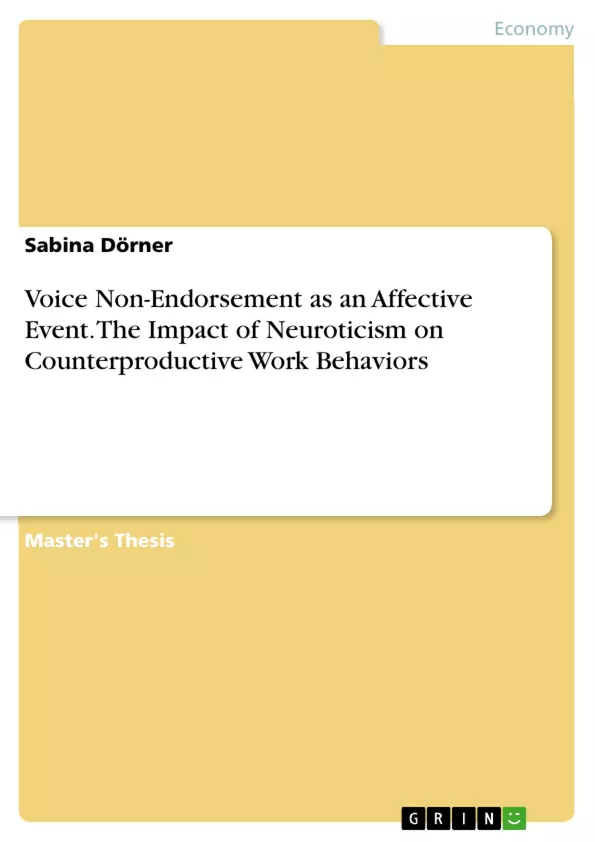When managers do not endorse their employees’ ideas, suggestions, or concerns about work-related issues, they may motivate neurotic employees to engage in counterproductive work behavior. The present study aims to explore the effects of employee neuroticism on counterproductive work behaviors following voice non-endorsement. Drawing on affective events theory, I propose that anger mediates the relationship between neuroticism and counterproductive work behaviors. I further argue that neuroticism has a stronger positive impact on counterproductive work behaviors via anger among employees who engage in surface acting. This study collected cross-sectional data on 212 participants. Hypotheses were tested using mediation, moderation, and moderated mediation analyses.
The paper is structured as follows: First, I outline the principles of AET before introducing voice non-endorsement as an affective work event. Second, I explain the relationships between neuroticism, anger, counterproductive work behaviors, and surface acting, along with the resulting hypotheses. Third, I elaborate on the methodological approach used by this study and present the statistical results of my analyses. Finally, I discuss implications for theory and practice, followed by the study’s limitations and future research directions.
Inhaltsverzeichnis (Table of Contents)
- Theoretical Background and Hypothesis Development
- Voice Non-Endorsement as an Affective Event
- When Voice is not Endorsed: The Role of Neuroticism
- Neuroticism and Anger Reactions to Voice Non-Endorsement
- Anger and Counterproductive Work Behaviors
- The Mediating Role of Anger
- The Moderating Role of Surface Acting
- Methods
- Participants and Procedure
- Measures
- Neuroticism
- Anger
- Surface Acting
- Counterproductive Work Behaviors
- Control Variables
- Analyses
- Results
- Descriptive Statistics
- Test of Hypotheses
- Discussion
- Theoretical Contributions
- Practical Implications
- Limitations and Directions for Future Research
Zielsetzung und Themenschwerpunkte (Objectives and Key Themes)
This thesis investigates the impact of voice non-endorsement, specifically when managers do not endorse employee suggestions, on the likelihood of counterproductive work behavior, especially among employees with high levels of neuroticism. Using affective events theory, the study aims to explore the mediating role of anger and the moderating role of surface acting in this relationship.
- The impact of voice non-endorsement on counterproductive work behavior
- The role of neuroticism in employee responses to voice non-endorsement
- The mediating effect of anger in the relationship between neuroticism and counterproductive work behavior
- The moderating effect of surface acting on the relationship between neuroticism and counterproductive work behavior
- The potential consequences of voice non-endorsement in the workplace and the importance of effective communication and emotional management.
Zusammenfassung der Kapitel (Chapter Summaries)
The theoretical background and hypothesis development chapter introduces the concept of voice non-endorsement as an affective event and explores its potential impact on employee behavior. It delves into the role of neuroticism in anger reactions to voice non-endorsement, focusing on the mediating role of anger and the moderating role of surface acting in the relationship between neuroticism and counterproductive work behaviors.
The methods chapter outlines the study's methodology, including participant recruitment, data collection procedures, and the measurement instruments used to assess neuroticism, anger, surface acting, and counterproductive work behaviors. The chapter also discusses the statistical analyses conducted to test the hypotheses.
The results chapter presents the descriptive statistics and the results of the hypothesis tests, providing evidence for the proposed moderated mediation model. The findings indicate a positive relationship between neuroticism, anger, and counterproductive work behaviors following voice non-endorsement.
The discussion chapter delves into the theoretical contributions of the study, highlighting its implications for understanding employee responses to voice non-endorsement and the role of individual factors in the workplace. It also discusses the study's practical implications, emphasizing the need for effective communication and emotional management strategies to mitigate the negative consequences of voice non-endorsement.
Schlüsselwörter (Keywords)
The key terms and concepts explored in this thesis include voice non-endorsement, counterproductive work behaviors, neuroticism, anger, affective work events, affective events theory, and surface acting. This study examines the influence of these factors on employee behavior in response to workplace situations where employee voice is not endorsed by managers.
- Quote paper
- Sabina Dörner (Author), 2022, Voice Non-Endorsement as an Affective Event. The Impact of Neuroticism on Counterproductive Work Behaviors, Munich, GRIN Verlag, https://www.grin.com/document/1415950



